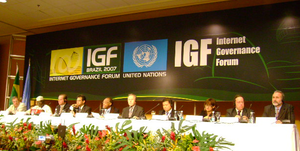 Image via Wikipedia
Image via WikipediaThe United Nations General Assembly has approved the renewal of the IGF Internet Governance Forum mandate for a period of another five years from the year 2011 to 2015. This year in 2011, the IGF will probably be hosted by Kenya at the United Nations office in Nairobi in September 2011 but there is no official announcement from the United Nations headquarters in New York on this.
The 2011 IGF Open consultations and MAG meeting will be convened in Geneva on 23 and 24 February 2011. The MAG meeting will be open to observers in accordance with a MAG decision taken during November 2010's last meeting while all its proceedings will be webcasted and made available as real-time transcriptions.
The final meeting within IGF's first mandate was hosted by Lithuania in the city of Vilnius during the third quarter of last year in September 2010 where a strong level of support was made for IGF's mandate renewal and its continuation in its current format with a certain amount of improvements in terms of what could be possible outcomes or ways it could affect global Internet Public Policy making. The issue of being able to make recommendations in some form remain as one of the key weaknesses of the IGF mainly due to the pressure from certain stakeholder groups participating in the IGF process.
IGF with the support and cooperation from its multistakeholder participation model has been successful in finding an innovative format for meetings bringing together all stakeholders to discuss public policy issues in a climate of trust of confidence. The annual meetings during its mandate's first cycle from Athens to Vilnius emerged as a platform to exchange ideas and information while sharing experiences and good practices. The IGF has been able to attract considerable attendance as well as attempted to improve increased remote participation but the challenge of getting the real voices from the developing world remains one of its greatest challenges.
The renewal of the IGF mandate for another five years from 2011 to 2015 brings a new set of issues and challenges that have already struck IGF multstakeholders and the global Internet community as is evident from the recent news and activities within the United Nations circles. It was believed for five years that this forum's new model of cooperation where governments accept non-governmental stakeholders as equals continued to evolve but many stakeholders believe that the concept of multistakeholderism was mulled during the December 2010 CSTD consultations in New York and Geneva were taken over by intergovernmental forces. This issue is still evolving but I have described this in detail in previous posts but the fact remains, there is no such other Internet forum at this global scale.
There is a smaller non-treaty and non-governmental model for only one function of Internet Governance, i.e. the technical co-ordination of the Internet Domain Name System, Root and IP Addressing, present independent of the IGF. This model is convened by a non-profit global multistakeholder model in the form of ICANN Public Meetings. that take place thrice around the globe and are open to all internet users, technical community, governments, research, academia, civil society and private sectors, literally to anyone and everyone.
As the General Assembly extends the IGF mandate for another five years, we the stakeholders of this important global forum are to witness a bumpy rocky road trip. Various stakeholder groups that have always attempted to prevent the IGF and the MAG from reaching consensus to approve issuing some form of outcome, recommendations or messages (the EURODIG - European Dialogue on the Internet Governance issues messages as an outcome) found that they had shot themselves in the foot when the governments suddenly ruled out participation of other stakeholder groups from the New York consultations.
This was a message to the world and the IGF community that Internet control is what some and most governments want as well as see the IGF to take that form and there has to be a renewal of strategy by all stakeholders to counter this perception if we want a sustainable, open, inclusive and neutral Internet to exist for us and our future generations.

No comments:
Post a Comment
Kindly leave your comments here but the author reserves the right to include or exclude comments where deemed necessary.